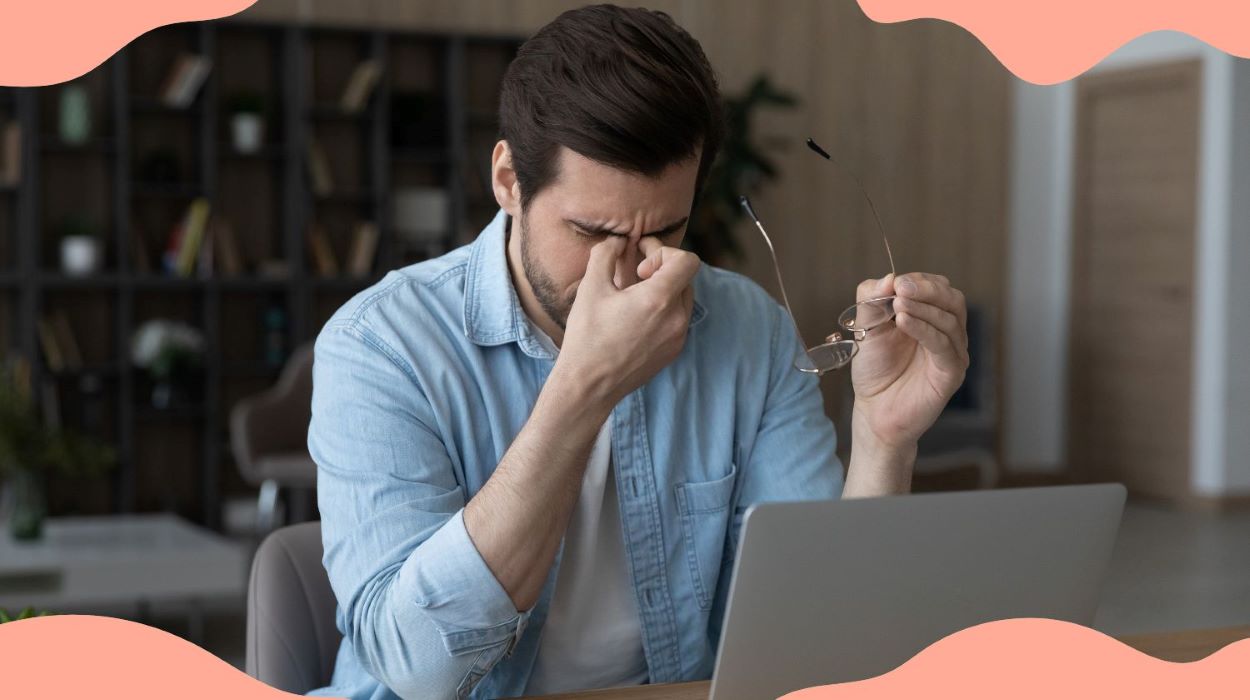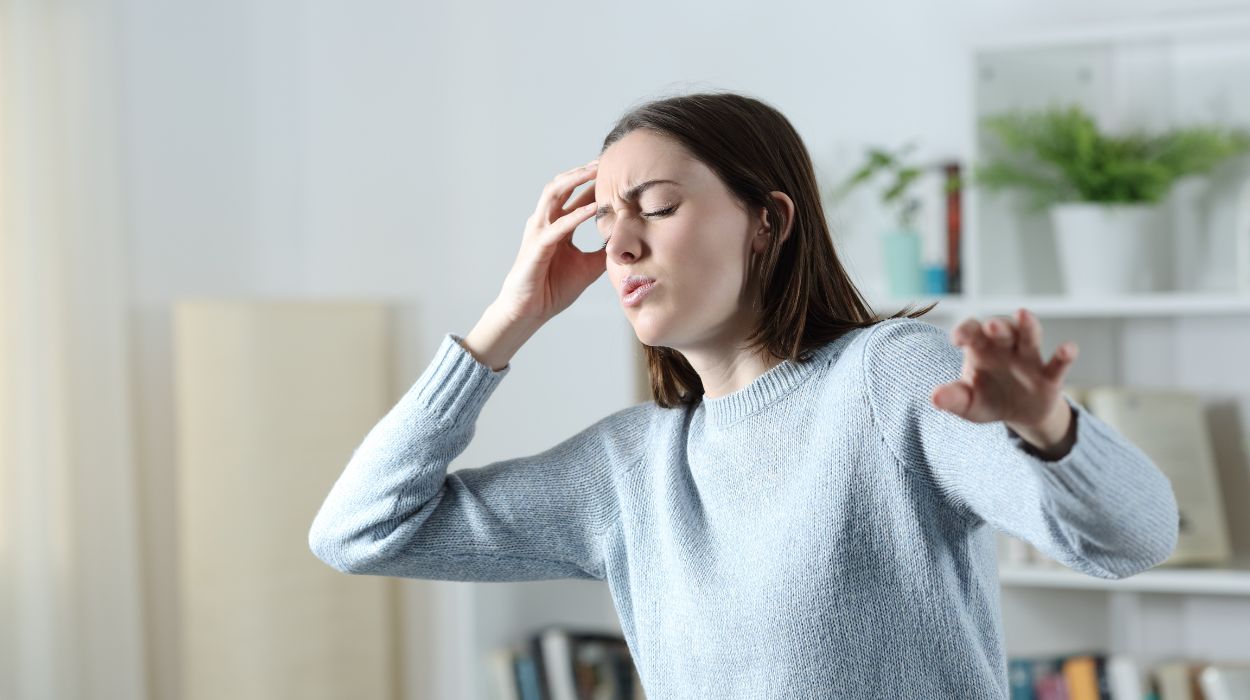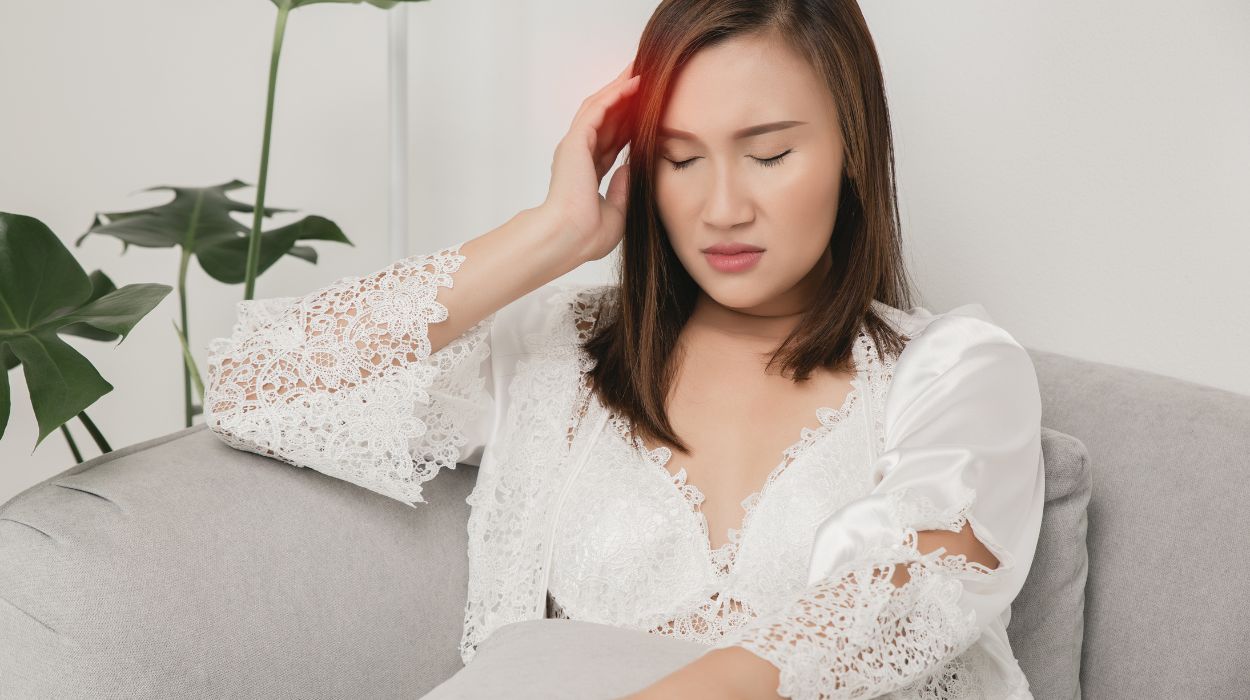 Evidence Based
Evidence Based
Evidence Based
This article is objectively based on relevant scientific literature, written by experienced medical writers, and fact-checked by a team of degreed medical experts.
Our team of registered dietitian nutritionists and licensed medical professionals seek to remain objective and unbiased while preserving the integrity of any scientific debate.
The articles contain evidence-based references from approved scientific sites. The numbers* in parentheses (*1,2,3) will take you to clickable links to our reputable sources.
Can Anxiety Make You Tired And Dizzy? Understanding The Connection

Dizziness, a disorienting and unsettling sensation, can often accompany anxiety, leading individuals to question the relationship between the two. In this article, we delve into the intricate link between anxiety and dizziness, exploring the physiological and psychological mechanisms at play. Anxiety, characterized by excessive worry and fear, can trigger a cascade of changes in the body during moments of heightened stress.
Understanding this relationship is crucial for effectively managing symptoms and improving overall well-being. Join us as we explore the fascinating connection between anxiety and dizziness and uncover strategies to promote balance and tranquility in both body and mind.
Can Anxiety Make You Tired And Dizzy?
Anxiety can make you tired and dizzy. When experiencing anxiety, the body’s stress response system goes into overdrive, leading to a variety of anxiety symptoms such as increased heart rate, shallow breathing, and elevated levels of stress hormones.
These physiological changes can contribute to fatigue and feelings of lightheadedness or dizziness. Additionally, anxiety can disrupt sleep patterns, leading to fatigue during the day. It is important to address the underlying anxiety to alleviate these symptoms and improve overall well-being.
The Link Between Anxiety And Dizziness

The link between anxiety and dizziness[1] is a complex and intriguing phenomenon that has been observed in many individuals. Anxiety, characterized by excessive worry and fear, can manifest itself in various physical symptoms, and dizziness is one of the common ones. When experiencing anxiety, the body’s stress response system goes into overdrive, triggering a cascade of physiological changes.
During moments of heightened anxiety or chronic anxiety, the body releases stress hormones like cortisol and adrenaline, which can lead to increased heart rate, elevated blood pressure, and shallow breathing. These physiological changes can disrupt the normal functioning of the vestibular system, responsible for maintaining balance and spatial orientation. As a result, individuals may experience sensations of lightheadedness, spinning, unsteadiness, or a feeling of being disconnected from their surroundings.
Furthermore, anxiety with an underlying anxiety disorder can also lead to hyperventilation or over-breathing, causing an imbalance in carbon dioxide levels in the body. This can lead to sensations of dizziness and even fainting in severe cases.
It’s worth noting that the relationship between anxiety and dizziness is often bidirectional. While anxiety can trigger dizziness, the experience of dizziness can also provoke anxiety or panic attacks, creating a vicious cycle.
Managing anxiety and its associated dizziness often involves a multifaceted approach. Getting a good night’s sleep is vital to managing the stress response. Learn more about how to sleep better with anxiety here.
Ways Anxiety Attack Can Cause Dizziness

Anxiety attacks[2] can cause dizziness through several mechanisms. When a person experiences intense anxiety or a panic attack, their body enters a heightened state of physiological arousal, triggering various changes that can lead to dizziness. Here are some ways anxiety attacks and anxiety disorders can cause dizziness:
- Hyperventilation[3]: One of the hallmark symptoms of anxiety attacks is rapid and shallow breathing, known as hyperventilation. This can upset the balance of oxygen and carbon dioxide in the body, leading to symptoms like lightheadedness, dizziness, and even tingling sensations in the extremities. Learn more about breathing exercises for anxiety here!
- Increased heart rate: Anxiety activates the body’s “fight-or-flight” response, causing the heart to beat faster. This can result in decreased blood flow to the brain, leading to feelings of dizziness or lightheadedness.
- Vasoconstriction[4]: During an anxiety attack, blood vessels constrict as a result of the surge in stress hormones like adrenaline. This constriction can restrict blood flow to the brain, causing dizziness or a feeling of being off-balance.
- Sensory overload[5]: Anxiety attacks can overwhelm the senses, leading to sensory overload. This overload can include heightened sensitivity to sounds, lights, and other environmental stimuli, which can contribute to dizziness or disorientation.
How To Treat Dizziness Associated With Anxiety

Treating dizziness associated with anxiety involves addressing both the underlying anxiety and the physical symptoms. Here are some strategies that can help alleviate dizziness:
Deep Breathing
Practice deep breathing[6] exercises to regulate your breathing patterns and reduce hyperventilation. Slowly inhale through your nose, hold your breath for a few seconds, and exhale through your mouth. This helps restore proper oxygen and carbon dioxide balance, reducing dizziness.
Lifestyle Modifications
Adopting healthy lifestyle habits can support overall well-being and reduce anxiety. Regular exercise, adequate sleep, a balanced diet, and avoiding substances like caffeine and alcohol can help stabilize mood and reduce dizziness. Yoga may also be helpful for both anxiety and depression.
Progressive Muscle Relaxation
Progressive Muscle Relaxation[7] involves systematically tensing and relaxing different muscle groups to promote relaxation and reduce anxiety. Start with your toes and work your way up to your head, tensing each muscle group for a few seconds before releasing the tension.
Medication
In some cases, healthcare professionals may prescribe medication to manage anxiety and its associated symptoms. Antidepressants, anti-anxiety medications, or beta-blockers can be prescribed to help control dizziness and alleviate anxiety. Supplements may also be beneficial for helping with anxiety. Read about the best anxiety supplements here.
Therapy
Cognitive-behavioral therapy (CBT)[8] can be highly effective in treating anxiety-related dizziness. It helps identify and challenge negative thought patterns and develop coping strategies for managing anxiety and dizziness.
When To See A Doctor
If you experience dizziness associated with anxiety, it is advisable to consult with a doctor under certain circumstances. It is recommended to seek medical attention if:
- The dizziness is severe, persistent, or accompanied by other concerning symptoms. This includes chronic subjective dizziness not associated with anxiety.
- You have never experienced anxiety or panic attacks before and are unsure of the cause.
- The dizziness significantly affects your daily life, making it difficult to perform routine activities.
- You have underlying health conditions or take medications that could contribute to dizziness.
- Self-help strategies and relaxation techniques are ineffective in managing the dizziness.
- You have concerns about the impact of dizziness on your overall health and well-being.
A doctor can assess your symptoms, provide a proper diagnosis, and offer guidance on appropriate treatment options. There are many causes of dizziness including different kinds of vestibular disorders, including benign paroxysmal positional vertigo and others. They may also want to rule out any underlying medical conditions that could be contributing to the dizziness.
Conclusion
In conclusion, the link between anxiety and dizziness is a complex interplay of physiological and psychological factors. Anxiety triggers a range of physiological changes, such as increased heart rate, hyperventilation, and vasoconstriction, which can disrupt the body’s balance and contribute to dizziness.
Conversely, the experience of dizziness can exacerbate anxiety, creating a cycle of fear and avoidance. However, there are effective treatments available to manage anxiety-related dizziness. These include cognitive-behavioral therapy (CBT) to address anxious thought patterns, relaxation techniques like deep breathing and progressive muscle relaxation, medication when necessary, and lifestyle modifications such as exercise and stress management.
It is important to consult a healthcare professional if dizziness is severe, persistent (chronic dizziness), or significantly impacting daily life, or if there are concerns about underlying health conditions. There are a variety of causes of dizziness other than anxiety, such as vestibular disorders. With the right approach and support, individuals can reduce the frequency and intensity of anxiety-induced dizziness and improve their overall well-being.
Frequently Asked Questions
During moments of heightened anxiety, the body releases stress hormones like cortisol and adrenaline, which can lead to increased heart rate, elevated blood pressure, and shallow breathing.
Anxiety attacks can cause dizziness through mechanisms such as hyperventilation, increased heart rate leading to decreased blood flow to the brain, vasoconstriction restricting blood flow to the brain, and sensory overload.
Strategies to treat dizziness associated with anxiety include deep breathing exercises, grounding techniques, progressive muscle relaxation, medication (prescribed by healthcare professionals), cognitive-behavioral therapy (CBT), lifestyle modifications, and stress management techniques. Supplements can also be beneficial, read about HUM Nutrition reviews here.
The relationship between anxiety and dizziness is often bidirectional. Anxiety can trigger dizziness through physiological changes, but the experience of dizziness can also provoke anxiety or panic attacks, creating a vicious cycle. Fear of future dizziness episodes can lead to heightened anxiety levels, exacerbating the symptoms.
+ 7 sources
Health Canal avoids using tertiary references. We have strict sourcing guidelines and rely on peer-reviewed studies, academic researches from medical associations and institutions. To ensure the accuracy of articles in Health Canal, you can read more about the editorial process here
- Annegret Eckhardt-Henn, Breuer, P., C. Thomalske, Søren Vrønning Hoffmann and Hopf, H. (2003). Anxiety disorders and other psychiatric subgroups in patients complaining of dizziness. [online] 17(4), pp.369–388. doi:https://doi.org/10.1016/s0887-6185(02)00226-8.
- Bandelow, B., Michaelis, S. and Wedekind, D. (2017). Treatment of anxiety disorders. [online] 19(2), pp.93–107. doi:https://doi.org/10.31887/dcns.2017.19.2/bbandelow.
- Lum, L.C. (2016). Hyperventilation and Anxiety State – L C Lum, 1981. [online] Journal of the Royal Society of Medicine. Available at: https://journals.sagepub.com/doi/abs/10.1177/014107688107400101 [Accessed 9 Jul. 2023].
- Mathew, R.J., William Julius Wilson, Humphreys, D.F., Lowe, J.V. and Wiethe, K.E. (1997). Cerebral vasodilation and vasoconstriction associated with acute anxiety. [online] 41(7), pp.782–795. doi:https://doi.org/10.1016/s0006-3223(96)00178-3.
- Neil, L., Nora Choque Olsson and Pellicano, E. (2016). The Relationship Between Intolerance of Uncertainty, Sensory Sensitivities, and Anxiety in Autistic and Typically Developing Children. [online] 46(6), pp.1962–1973. doi:https://doi.org/10.1007/s10803-016-2721-9.
- Ravinder Jerath, Braun, M., Barnes, V.A. and Harden, K. (2015). Self-Regulation of Breathing as a Primary Treatment for Anxiety. [online] ResearchGate. Available at: https://www.researchgate.net/publication/274965480_Self-Regulation_of_Breathing_as_a_Primary_Treatment_for_Anxiety.
- Google Books. (2018). International Journal of Indian Psychology, Volume 6, Issue 1, (No. 1). [online] Available at: https://books.google.com.vn/books?hl=en&lr=&id=Q8NmDwAAQBAJ&oi=fnd&pg=PA106&dq=anxiety+progressive+muscle+relaxation&ots=-DQcclVmaO&sig=JKAWSMW8n6R0jWLH5sOCCyAjHWc&redir_esc=y#v=onepage&q=anxiety%20progressive%20muscle%20relaxation&f=false.



